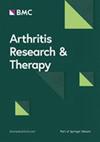靶向中性粒细胞驱动的炎症在成人发病still病:从基因表达谱的分子见解
IF 4.6
2区 医学
Q1 Medicine
引用次数: 0
摘要
成人发病斯蒂尔氏病(AOSD)的罕见性和异质性对理解其确切的致病机制、制定有效的治疗方案和建立治疗策略提出了重大挑战。对基因表达谱的全面分析可以帮助弥合这些领域的知识差距。获取了包括31例AOSD患者和22例健康对照者的血液转录组数据集。通过分析差异表达基因(DEGs)和功能富集来鉴定细胞和分子特征。利用核扩散评分技术确定了中性粒细胞活化的最佳分子靶点。血液分子特征表明中性粒细胞脱粒是AOSD中最富集的病理过程。中性粒细胞脱粒与Fcγ受体、IL-1受体和趋化因子受体的表达及其信号转导活性显著相关。IL-1抑制剂和IL-6抑制剂没有表现出有利于直接使中性粒细胞脱颗粒失活的扩散评分,但靶向CXCR1/CXCR2、C5AR1、中性粒细胞弹性酶、SRC和SYK的药物对中性粒细胞脱颗粒表现出显著的扩散评分。特别地,CXCR1、CXCR2和C5AR1是在中性粒细胞中主要表达的deg,并且在特定环境的功能分析中与中性粒细胞脱粒密切相关。中性粒细胞活化是AOSD的一个关键病理模块。针对中性粒细胞的治疗方法可能为调节AOSD的炎症反应提供了一个有希望的机会。本文章由计算机程序翻译,如有差异,请以英文原文为准。
Targeting neutrophil-driven inflammation in adult-onset still’s disease: molecular insights from gene expression profiles
The rarity and heterogeneity of adult-onset Still’s disease (AOSD) pose significant challenges in understanding its precise pathogenic mechanisms, developing effective treatment options, and establishing therapeutic strategies. A comprehensive analysis of gene expression profiles could help to bridge the knowledge gaps in those areas. A blood transcriptomic dataset comprising 31 patients with AOSD and 22 healthy controls was fetched. Cellular and molecular features were identified by analyzing differentially expressed genes (DEGs) and functional enrichment. Optimal molecular targets for neutrophil activation were identified using kernel-based diffusion scoring techniques. Blood molecular signatures indicate that neutrophil degranulation is the most enriched pathological process in AOSD. Neutrophil degranulation correlated significantly with the expression of Fcγ receptors, IL-1 receptors, and chemokine receptors and their signaling activities. IL-1 inhibitors and IL-6 inhibitors did not exhibit a diffusion score favorable for directly deactivating neutrophil degranulation, but agents targeting CXCR1/CXCR2, C5AR1, neutrophil elastase, SRC, and SYK demonstrated significant diffusion scores for neutrophil degranulation. In particular, CXCR1, CXCR2, and C5AR1 were the DEGs predominantly expressed in neutrophils and closely associated with neutrophil degranulation in a context-specific functional analysis. Neutrophil activation is a key pathological module in AOSD. Therapeutic approaches aimed at neutrophils could offer a promising opportunity to regulate the inflammatory response in AOSD.
求助全文
通过发布文献求助,成功后即可免费获取论文全文。
去求助
来源期刊

Arthritis Research & Therapy
RHEUMATOLOGY-
CiteScore
8.60
自引率
2.00%
发文量
261
审稿时长
14 weeks
期刊介绍:
Established in 1999, Arthritis Research and Therapy is an international, open access, peer-reviewed journal, publishing original articles in the area of musculoskeletal research and therapy as well as, reviews, commentaries and reports. A major focus of the journal is on the immunologic processes leading to inflammation, damage and repair as they relate to autoimmune rheumatic and musculoskeletal conditions, and which inform the translation of this knowledge into advances in clinical care. Original basic, translational and clinical research is considered for publication along with results of early and late phase therapeutic trials, especially as they pertain to the underpinning science that informs clinical observations in interventional studies.
 求助内容:
求助内容: 应助结果提醒方式:
应助结果提醒方式:


